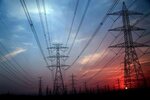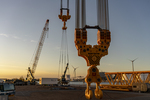News Release from WindEurope
Wind Industry Profile of
06/23/2012
EWEA Blog - Offshore wind power: EC should help organise Europe’s sea space
Meanwhile, Europe’s maritime nations are currently operating under their own planning rules and guidelines, which often conflict with their neighbours and waste time and money.
This was the focus of a two year project, funded by the European Commission’s Intelligent Energy Europe programme and coordinated by EWEA, entitled SEANERGY 2020. The main findings and policy recommendations of the project were presented at a final workshop as part of the European Union Sustainable Energy Week.
A panel debate also took place with members of the European Commission, Danish Fishermen Association, Marine Scotland, European Ocean Energy Association and Energy Research Centre of Netherlands, to name just a few.
All panellists seemed to be in agreement that something needed to be done about planning the use of Europe’s seas because a common framework is currently lacking.
The SEANERGY 2020 report suggests that the European Commission oblige member states to undertake Maritime Spatial Planning (MSP) through a Directive. This will minimise conflict, reduce cost and give certainty to investors and developers.
The Directive would ideally have two parts. It would require Member States to adopt national MSP legislation over an agreed time frame and would promote cross border cooperation on MSP.
Staffan Ekwall, Policy Officer at the European Commission, said they are currently finalising an EC proposal and hope to have it presented to Parliament and the Council by the end of the year.
“What this essentially is about, is to make Member States cooperate with one another,” Ekwall said.
Ekwall was also sure to highlight that the Commission will be sector neutral. It will not favour, for example, the fishing sector over offshore renewables, or vice versa.
“We think they (varying sea sectors) can coexist and can actually benefit from each other. It’s about bringing together priorities,” Ekwall said.
Belgium is a case in point since it is very progressive with offshore renewable energy but is a small country and wants to expand offshore renewables outside of its borders. It borders the Netherlands, which has a very large shipping industry and has different priorities when it comes to sea space.
Although Ekwall said a proposal is being finalised, he urged panellists not to wait for a Directive from the European Commission because it will take time.
For more information on this article or if you would like to know more about what www.windfair.net can offer, please do not hesitate to contact Trevor Sievert at ts@windfair.net
www.windfair.net is the largest international B2B Internet platform – ultimately designed for connecting wind energy enthusiasts and companies across the globe!
This was the focus of a two year project, funded by the European Commission’s Intelligent Energy Europe programme and coordinated by EWEA, entitled SEANERGY 2020. The main findings and policy recommendations of the project were presented at a final workshop as part of the European Union Sustainable Energy Week.
A panel debate also took place with members of the European Commission, Danish Fishermen Association, Marine Scotland, European Ocean Energy Association and Energy Research Centre of Netherlands, to name just a few.
All panellists seemed to be in agreement that something needed to be done about planning the use of Europe’s seas because a common framework is currently lacking.
The SEANERGY 2020 report suggests that the European Commission oblige member states to undertake Maritime Spatial Planning (MSP) through a Directive. This will minimise conflict, reduce cost and give certainty to investors and developers.
The Directive would ideally have two parts. It would require Member States to adopt national MSP legislation over an agreed time frame and would promote cross border cooperation on MSP.
Staffan Ekwall, Policy Officer at the European Commission, said they are currently finalising an EC proposal and hope to have it presented to Parliament and the Council by the end of the year.
“What this essentially is about, is to make Member States cooperate with one another,” Ekwall said.
Ekwall was also sure to highlight that the Commission will be sector neutral. It will not favour, for example, the fishing sector over offshore renewables, or vice versa.
“We think they (varying sea sectors) can coexist and can actually benefit from each other. It’s about bringing together priorities,” Ekwall said.
Belgium is a case in point since it is very progressive with offshore renewable energy but is a small country and wants to expand offshore renewables outside of its borders. It borders the Netherlands, which has a very large shipping industry and has different priorities when it comes to sea space.
Although Ekwall said a proposal is being finalised, he urged panellists not to wait for a Directive from the European Commission because it will take time.
For more information on this article or if you would like to know more about what www.windfair.net can offer, please do not hesitate to contact Trevor Sievert at ts@windfair.net
www.windfair.net is the largest international B2B Internet platform – ultimately designed for connecting wind energy enthusiasts and companies across the globe!
- Source:
- European Wind Energy Association
- Author:
- Posted by Trevor Sievert, Online Editorial Journalist / By Megan Swieca, http://blog.ewea.org/
- Email:
- ewea@ewea.org
- Link:
- www.ewea.org/...
- Keywords:
- EWEA; wind, wind energy, wind turbine, rotorblade, awea, ewea, wind power, suppliers, manufacturerstrevor sievert


























